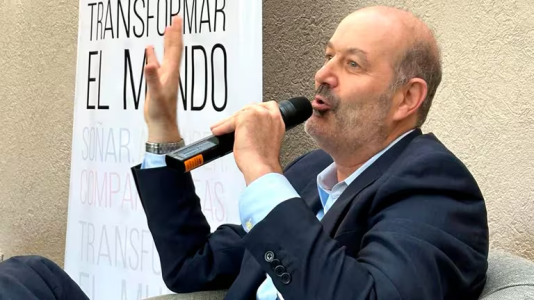All the Answers
Well-known member
The 5 reasons that Javier Milei gave to explain his theory that the dollar is not behind - Infobae

Source:

Las 5 razones que dio Javier Milei para explicar su teoría de que el dólar no está atrasado
El Presidente describió en su cuenta de X que la Argentina está en un proceso de ordenamiento de precios relativos, donde es cara en dólares por su estructura fiscal y regulatoria. Dio a entender que no sería necesaria una nueva devaluación
May 03, 2024
The President described in his X account that Argentina is in a process of ordering relative prices, where it is expensive in dollars due to its fiscal and regulatory structure. He implied that a new devaluation would not be necessary

Milei resumed the discussion on the level of the official exchange rate.
President Javier Milei made a post on his official X account in which he reflected on the discussions surrounding whether the price of the official dollar fell behind in real terms after the last devaluation. “Exchange delay?” begins the publication.
"Although it is impossible to know the deep parameters (preferences, technology and endowments) for all humanity in the present and the future, so only by chance could a human being determine the vector of equilibrium prices and thereby speak of the deviation , at least briefly we could ask ourselves if a certain policy framework implies a path in that direction,” Milei reflected.
Immediately, the President gave five reasons why the exchange rate remains at an appropriate level with respect to his economic program:
- Financial surplus in the treasury
- Constant monetary base
- Almost zero gap, with purchase of net reserves
- Rehabilitation of the BC balance sheet
- Lifting of restrictions in the exchange market every day until one day it is completely out of the stocks.

Caputo defended the fiscal and monetary plan and ruled out a new devaluation
Then, Milei reposted a publication by economist Federico Furiase , advisor to the Ministry of Economy . “Clear what the President says. The real appreciation is the result of the fiscal and monetary anchor and the sanitation of the BCRA. The collapse in gap, country risk and inflation] reflect that consistency. The real rate rises while the nominal rate falls and real appreciation moderates with the crawling peg of 2%,” commented Furiase.
The statements are in line with the words given this week by the Minister of Economy, Luis Caputo , in his speech at the Buenos Aires Stock Exchange . There he stated that the appreciation of the exchange rate “is here to stay” and that we should not expect “a shock” in terms of the value of the dollar .
“If you do your homework, the real exchange rate appreciates. We are going to live with a more appreciated exchange rate, we have fiscal balance and a trade surplus. If we maintain that, that appreciation is here to stay ,” noted Caputo at an event organized by the Mediterranean Foundation. “We do not set a real exchange rate goal, it is not a reasonable measure,” he said in conversation with Juan Ignacio Abuchdid , from the IEB Group.
“Comparing one year to another may be similar but it is not a valid comparison. We are not unaware that many look at that. The average real exchange rate was $880 over the last 120 years. And in moments of confidence, the exchange rate at today's prices was $560, almost half of today. We are going to live with a more appreciated exchange rate . We have fiscal balance and trade surplus. That appreciation is here to stay, don't wait for the shock. For those who are still waiting for an expensive real exchange rate: that is not going to happen,” mentioned the head of the Treasury Palace.
“Theorem of the impossibility of the public company”
On the other hand, Milei reposted a publication by Federico Sturzenegger , presidential advisor and author of the Base Law and DNU 70/2023 with which they seek to advance in deregulating the economy. The economist recalled the “Theorem of the impossibility of the public company” which says that “if the State has a public company, the regulatory quality of a sector is inversely proportional to the relevance of the company in the sector.”
Federico Sturzenegger spoke about the Theorem of the Impossibility of the Public Company.
“It means that if you have a public company and in a sector sector,” explained Sturzenegger.
“There is an extensive literature on regulatory capture. Companies that attract the regulator to generate regulations in their favor. But when there is a public company, the regulated party is the regulator. An impossible situation,” he added.
The economist maintained that examples “abound.” “Unnecessary monopolies that persist to support the public company. Or else why did we have our heavens closed for 100 years? Why do we have a postal law that gives a monopoly to Correos Argentinos and that even allows the State to open correspondence?
“Why was the absurdity of Law 27,007 that transferred an income equivalent to one GDP to the oil companies? (There is the true cost of the nationalization of YPF). "Why was satellite internet restricted, which will soon allow comprehensive coverage of our country?" Sturzenegger concluded.

